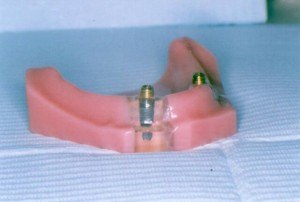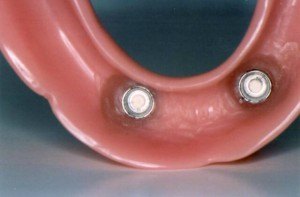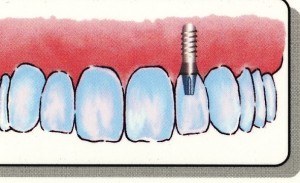Dental Implants
Approximately 25 million Americans have no remaining teeth (are edentulous) and many more are missing some teeth. The teeth work together to help us chew, smile and speak. While we chew our jaws close together with a lot of force, which puts pressure on our teeth. The more teeth we have to handle that pressure the lesser the stress on each tooth. If a tooth is removed, the remaining teeth have to absorb an added load. Also the loss of a tooth creates a space. Teeth next to space can lean over into the space and the tooth that opposes the space can erupt out further. As these neighbors drift out of their normal position they can become more susceptible to cavities, loss of bone support and sensitivity. Thus it is usually beneficial to replace missing teeth.
Common alternatives for the replacement of teeth are removable dentures and fixed bridges which can be cemented onto neighboring teeth. However, many denture wearers experience denture looseness or difficulty talking, chewing, or swallowing. Bridges are sometimes difficult to clean allowing food and germs to get trapped around and under them. The neighboring teeth that anchor a bridge have to carry an extra load and can fracture.
As a result a growing number of people are choosing dental implants. Implants are man-made tooth roots and can anchor crowns (caps), bridges, and removable dentures. They are growing in popularity because they have a high rate of success. Numerous research studies have revealed that over 90% of implants serve as painless, healthy tooth roots for many years.



Model of lower jaw with a dental implant. The red area represents the gums. The implant, which would sit in the jaw bone can be seen in the transparent section. The gold top can snap into the underside of a denture.
Bottom side of a lower denture with snap connectors, which can snap into the gold tops located above the implants in the previous picture. This enables the denture to hold in the mouth more tightly.
Diagram showing a dental implant (the rod-shaped located in the red area), an abutment that can connect an implant and crown (the tapered object beneath the implant) and the white crown.
What is a dental implant?
An implant is an artificial tooth root or anchor, which can be inserted into the upper or lower jaw bone. It is composed of metals similar to the type used by Orthopedic surgeons to repair or replace knees or hips. After it is placed the jaw bone can grow into and bond with the implant forming a stable support for one or more missing teeth.
How can implants help a person who has no teeth and uses complete dentures?
Complete denture users often report difficulty chewing or talking because of denture looseness. Tiny connectors that resemble snaps used on coats can be placed inside a denture and implants so that the denture can tightly hold onto them. Removal of the denture can be performed in the same way the two pieces of a coat snap can be separated.
How much healing time is needed before an implant can serve as an anchor for a crown, bridge or denture?
The healing time depends upon the size of the implant, the amount of bone supporting the implant, the strength of the supporting bone, and the amount of stress the implant will be expected to handle. Sometimes an implant can be used an anchor immediately, but usually 4-6 months of healing are needed prior to placing weight on the implant.
What is the fee for implant treatment?
The fee varies depending upon the number of implants and several other factors. The fee for the insertion of normal full sized implant is approximately $1800. Additional fees for the crown, bridge or denture and the gadgets needed to connect the implant to them would also exist. In some instances lower dentures can be anchored to mini implants. Mini implants are shorter, thinner and less costly ($175) than standard implants. Sometimes five or six minis can be used to anchor a complete lower denture.
Are any of the fees covered by insurance carriers?
Some dental insurance policies will pay some of the fees associated with implant procedures. Each policy is different. You can contact your insurance carrier directly or ask my receptionist to inquire for you.
Can implants replace teeth anywhere in the mouth and can used by everyone?
An implant is similar to a screw. It retention is dependent upon its length and width and the hardness of the material where it is placed. In areas that contain long, wide and strong bone a dentist can place longer and wider implant. The greater the number of screws placed the greater their capability to hold crowns, bridges or dentures in place. In areas where little bone exists it may not be possible to firmly connect dental implants.
Implants can firmly integrate (bond) to jaw bone in people who are healthy. Some people with conditions that compromise their healing capacities or the quality of their jaw bone may not achieve as good a result as others.
If you need immediate care, contact us at 610-906-8882.
24 Hour Emergency Dentist
***





